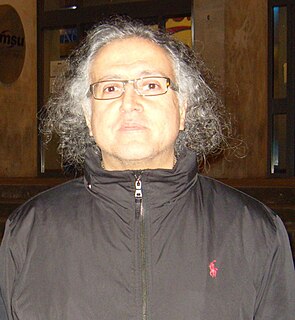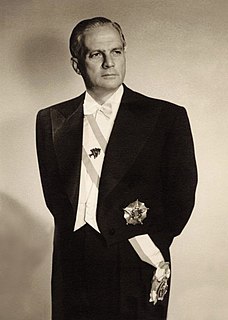
Khalil Gibran ; sometimes spelled Kahlil; was a Lebanese-American writer, poet, visual artist and Lebanese nationalist.
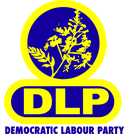
The Democratic Labour Party (DLP) is a political party which was established in 1955 in Barbados. It was the ruling party of Barbados from 15 January 2008 to 24 May 2018, but faced an electoral wipeout in the 2018 general election which left it with no MPs.
The Taif Agreement was an agreement reached to provide "the basis for the ending of the civil war and the return to political normalcy in Lebanon". Negotiated in Ta'if, Saudi Arabia, it was designed to end the decades-long Lebanese Civil War, reassert Lebanese authority in Southern Lebanon, though the agreement set a time frame for Syrian withdrawal and stipulated that the Syrians withdraw in two years. It was signed on 22 October 1989 and ratified by the Lebanese parliament on 5 November 1989.
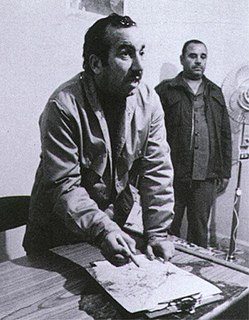
Khalil Ibrahim al-Wazir was a Palestinian leader and co-founder of the nationalist party Fatah. As a top aide of Palestine Liberation Organization (PLO) Chairman Yasser Arafat, al-Wazir had considerable influence in Fatah's military activities, eventually becoming the commander of Fatah's armed wing al-Assifa.
Al-Ashraf Salāh ad-Dīn Khalil ibn Qalawūn was the eighth Mamluk sultan between November 1290 until his assassination in December 1293. He was well known for conquering the last of the Crusader states in Palestine in the capture of Acre in 1291.
Dory Chamoun is a Lebanese politician who leads the National Liberal Party (NLP), and is also a prominent member of the Qornet Shehwan Gathering, a coalition of politicians, academics, and businessmen who oppose the pro-Syrian March 8 Alliance and Syrian influence in Lebanon. He is the eldest son of late Lebanese president Camille Chamoun and brother of Dany Chamoun.

Shajar al-Durr was the second Muslim woman to become a monarch in Islamic history. She was the wife of As-Salih Ayyub, Egypt Sultan of the Ayyubid dynasty and later Izz al-Din Aybak, Egypt Sultan of the Bahri dynasty.

Saad El-Din Rafik Al-Hariri is a Lebanese politician who has been the Prime Minister of Lebanon since December 2016. He was also the Prime Minister from November 2009 to June 2011. He is the second son of former Lebanese Prime Minister Rafic Hariri, who was assassinated in 2005. Hariri has also been the leader of the Future Movement party since 2005. He is seen as "the strongest figurehead" of the March 14 Alliance. After three years living overseas, he returned to Lebanon on 8 August 2014 and was designated Prime Minister on 3 November 2016. Hariri's surprise announcement of an intent to resign, broadcast on 4 November 2017 on Saudi state TV, has widely been seen as part of the Iran–Saudi Arabia proxy conflict in Lebanon, and triggered a dispute between Lebanon and Saudi Arabia. The resignation was later suspended, following President Michel Aoun's request to "put it on hold ahead of further consultations". Hariri rescinded his resignation on 5 December.
Al Akhbar is a daily Arabic language newspaper published in a semi tabloid format in Beirut. It also started an English version published on the Internet. The paper describes itself as independent and progressive.
Al Hamdan is a Druze clan based in Jabal al-Druze, a mountainous region in southeastern Syria. They were among the earliest Druze settlers in Jabal Hauran and were the dominant local force in that region between their establishment there in 1711 and circa 1860, when the al-Atrash clan became the prominent Druze power.
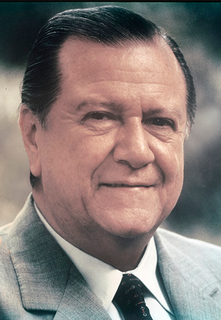
General elections were held in Venezuela on 1 December 1968. The presidential election was won by Rafael Caldera of Copei, who received 29.1% of the vote. Acción Democrática remained the largest party in the Chamber of Deputies and Senate. Voter turnout was 96.7% in the presidential election and 94.5% in the Congressional elections. When Caldera took office in March 1969, it marked the first time in Venezuela's history as an independent nation that the sitting government peacefully transferred power to an elected member of the opposition.
General elections were held in Lebanon on 25 May 1947, with a second round in some constituencies on 1 June. Independent candidates won the majority of seats. Voter turnout was 61.5%.
General elections were held in Lebanon between 12 June and 2 July 1960. Independent candidates won the majority of seats. Voter turnout was 50.7%.
General elections were held in Lebanon between 24 March and 7 April 1968. Independent candidates won the majority of seats, although many of them were considered to be members of various blocs. Voter turnout was 49.6%.
General elections were held in Lebanon between 16 and 30 April 1972. Independent candidates won the majority of seats, although most of them were considered members of various blocs. Voter turnout was 54.4%.
Assaf Abu Rahhal was a veteran Lebanese journalist who was killed by the Israeli Defense Forces during the 2010 Israel–Lebanon border clash, in which an Israeli reserve lieutenant colonel was killed and a captain was shot and injured by Lebanese sniper fire.
Voting to elect five members of the Lebanese parliament took place in the Beirut III district on March 24, 1968, part of the national general election of that year. The constituency had 75,296 eligible voters, out of whom 30,713 voted.
Voting to elect four members of the Lebanese parliament took place in the predominantly Shia Muslim Marjeyoun-Hasbaya constituency in southern Lebanon on March 31, 1968, part of the national general election of that year. Two of the seats of the constituency were earmarked for the Shia Muslim community, one for the Sunni Muslims and one for the Greek Orthodox. The constituency had 45,849 eligible voters, out of whom 23,224 voted. The polling day was marred by heavy rains.
The Za'im system, also known as zuama clientelism, is a corrupt patronage system in Lebanon. A political boss, known as a Za'im, is from the leading family in the country's electoral districts. They manipulate elections and distribute political favours and financial rewards to the highest bidder. A za'im can run for office or encourage votes for another to have another in his debt. Votes are often obtained through bribery or force. Individuals elected to parliament view their primary goal to serve the needs of their local clients, neglect any national issues and use parliament to further their regional-sectarian interests. The Za'im dressed in tailored European suits, which misled many visitors at the time. According to As'ad AbuKhalil, many of the za'im became warlords during the Lebanese Civil War. He has also stated that they are often sponsored by foreign governments, through which foreign embassies play a role in making political decisions in Lebanon.

